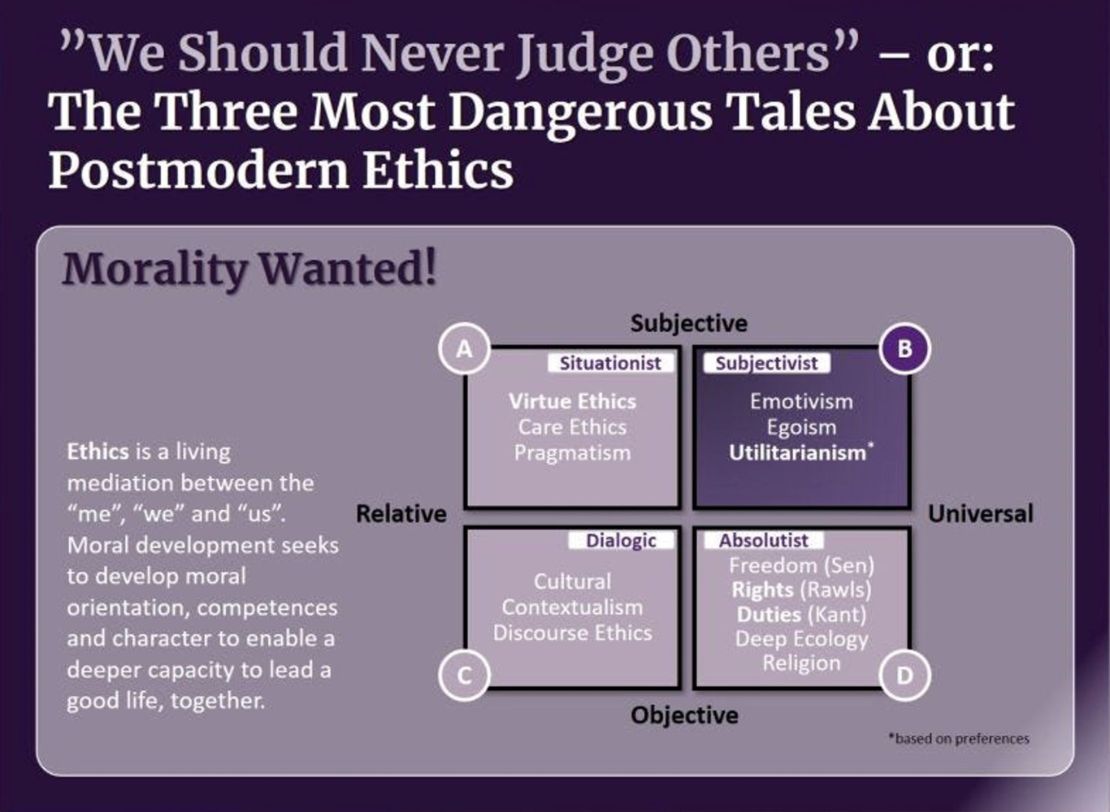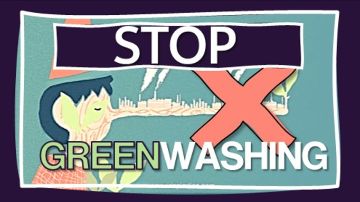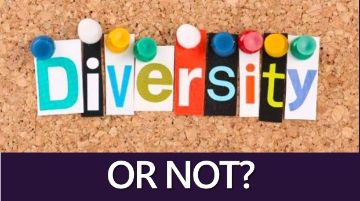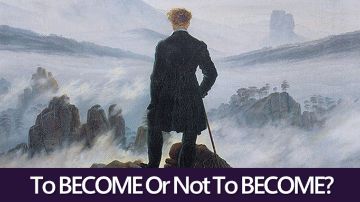
It is sometimes flabbergasting how strongly we argue about ethical positions, whilst many of us seem to have a very haphazard understanding of basic ethical theories. Sadly, this quickly leads to the perpetuation of half truths, and the insistence on a set of rather simplistic logical fallacies...

It is sometimes flabbergasting how strongly we argue about ethical positions, whilst many of us seem to have a very haphazard understanding of basic ethical theories. Sadly, this quickly leads to the perpetuation of half truths, and the insistence on a set of rather simplistic logical fallacies that every basic textbook in (business) ethics addresses extensively. Here are my "favourites":
1. We should never judge other people, because everybody is different (and has a right to their own view)!
- Individualism defaults to "subjectivist" or "relativist" ethics which are highly problematic in their effects
- We stop to find out what is "objectively" good for everybody and wrongly insist that every opinion has equal truth or value
- We egoistically put our own needs first, and refuse to moderate ourselves to enable a good life for all
- We emphasise what separates us rather than cherish what we have in common - always afraid of "collectivism"
- The aim of ethics certainly is not to judge others from an unexamined or simplistic subjective/ideological perspective, but to engage in a living mediation between the "me", "we" and "us". Negative freedoms always create negative externalities - moral development seeks to develop moral orientation, competences and character to enable a deeper capacity to lead a good life, together.
2. We cannot judge people, as morality is not based on facts! The world is too complex for universal truths.
- Scientific rationalism favours "objective" and descriptive approaches (e.g. "culture") - whilst moral or spiritual stances are allegedly only "subjective"
- This is a category error: science can never answer "should" questions - ethics is normative, not descriptive
- All widely accepted ethical theories are NOT simply subjective (see an illustrative positioning of some of the key theories in the table
- Authority is persecuted as "domination". Educators do not know which values to endorse & whether/how to teach them
- We fail to realise that every organisation, theory, process is intrinsically moral (esp. economics)
- Moral awareness is critical as it does not develop without support. However, it should never just be indoctrinated.
Thanks to Dr Sai Aanchal for prompting me to update some slides that Antoinette and I originally proposed at Dr Simon Western's ecoleadership seminars, talking about "virtuous leadership". The recording is below.
#leadershipdevelopment #ethics #philosophy #transformation #goodorganisations #uniteforgood #leadersforhumanity #business #agile
It is sometimes flabbergasting how strongly we argue about ethical positions, whilst many of us seem to have a very haphazard understanding of basic ethical theories. Sadly, this quickly leads to the perpetuation of half truths, and the insistence on a set of rather simplistic logical fallacies that every basic textbook in (business) ethics addresses extensively. Here are my "favourites":
1. We should never judge other people, because everybody is different (and has a right to their own view)!
- Individualism defaults to "subjectivist" or "relativist" ethics which are highly problematic in their effects
- We stop to find out what is "objectively" good for everybody and wrongly insist that every opinion has equal truth or value
- We egoistically put our own needs first, and refuse to moderate ourselves to enable a good life for all
- We emphasise what separates us rather than cherish what we have in common - always afraid of "collectivism"
- The aim of ethics certainly is not to judge others from an unexamined or simplistic subjective/ideological perspective, but to engage in a living mediation between the "me", "we" and "us". Negative freedoms always create negative externalities - moral development seeks to develop moral orientation, competences and character to enable a deeper capacity to lead a good life, together.
2. We cannot judge people, as morality is not based on facts! The world is too complex for universal truths.
- Scientific rationalism favours "objective" and descriptive approaches (e.g. "culture") - whilst moral or spiritual stances are allegedly only "subjective"
- This is a category error: science can never answer "should" questions - ethics is normative, not descriptive
- All widely accepted ethical theories are NOT simply subjective (see an illustrative positioning of some of the key theories in the table
- Authority is persecuted as "domination". Educators do not know which values to endorse & whether/how to teach them
- We fail to realise that every organisation, theory, process is intrinsically moral (esp. economics)
- Moral awareness is critical as it does not develop without support. However, it should never just be indoctrinated.
Thanks to Dr Sai Aanchal for prompting me to update some slides that Antoinette and I originally proposed at Dr Simon Western's ecoleadership seminars, talking about "virtuous leadership". The recording is below.
#leadershipdevelopment #ethics #philosophy #transformation #goodorganisations #uniteforgood #leadersforhumanity #business #agile
Popular articles in the KnowledgeHub: Business Transformation





 .
.